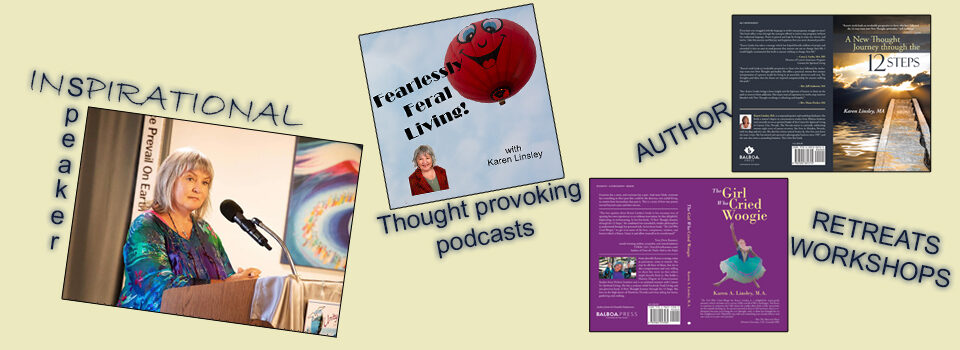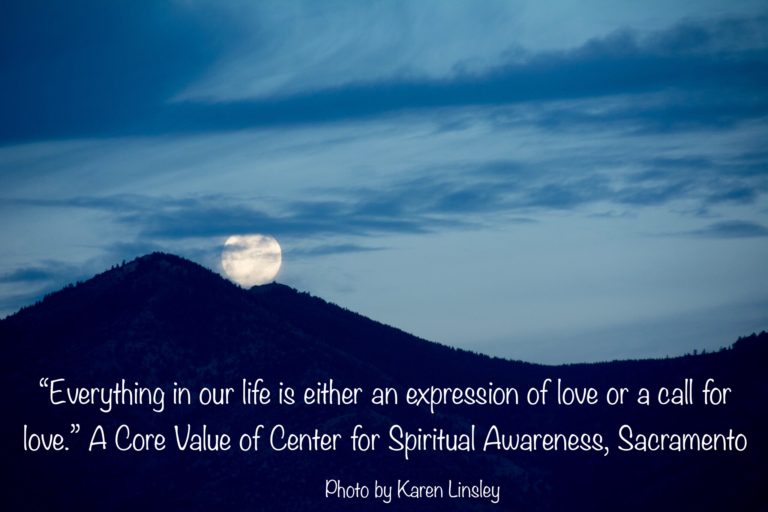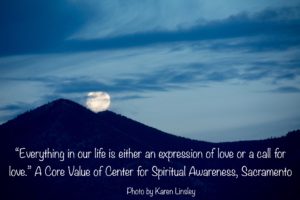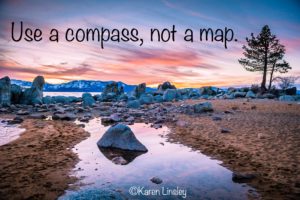Tag: empowerment
Use a compass, not a map
Let’s face it, we all have goals in life. Even companies and organizations have goals. What varies is how we get to those goals. If you have ever consulted a life coach, they would likely give you a formula that looks something like this:
- Set the goal
- Determine the steps needed to accomplish the goal
- Assign timelines, an overall one for for accomplishment of the goal, and then individual timelines, for accomplishment of each task.
- Then said life coach becomes your “accountability partner.”
Nothing wrong with this formula. Except that I have found it doesn’t work well. Life happens, and it doesn’t take into account those twists and turns, nor does it take into account the extraordinary level of sheer stubbornness needed to accomplish things this way. Accomplishing goals this way seems like a gigantic battle. Not to mention....I’m a big girl.....if I can’t hold myself accountable for doing things in my life, no one else is going to be able to do so.
I prefer this formula:
- Who are you? Who do you be? What are your beliefs and values?
- What is your purpose for being here? This describes your reason for being.
- What is your mission in life? This describes your short and mid range goals.
- What is your vision for your life? This will draw on your mission.
And just for an example, here is mine:
- I am a physical manifestation of spirit.
- My purpose for being here is to live in peace and joy, at my best and highest levels, and to help others do the same.
- My mission is to design and implement workshops, classes, retreats and other things to facilitate that peace and joy in others.
- My vision is that everyone live lives of peace and joy.
This is my compass. It points me in a general direction, and as long as I am going in that general direction, I’m good. The steps, the map, might change. After all, maps need to be changed all the time. Global warming means water levels on earth are changing. Earthquakes mean topography changes. When stuff happens in our lives, the map changes. But the compass will always point us in the right direction. And having a formula like this in your life will accommodate the changing topography that happens in all our lives.
As for that accountability partner, well, I prefer enthusiastic supporter. This would be someone who knows your beliefs and values, and who holds those beliefs and values upper most in their minds, and reminds you of them when you have forgotten them. In this way, you have the dignity that comes from empowerment that comes from taking personal responsibility for your life. No one else can do that for you.
Don’t Ask Why
I had a couple of wonderful discussions recently about why. There is a lot of shit going on in the world today: crazy politics, terrorism, violence. The human response, typically, amongst people who care, is to find out why these things happen, then enact laws and policies to prevent them from happening in the future.
The result is a society over burdened with rules that severely encroach on personal liberty. And...the long term result of this is a gradual disempowerment of the populace. We have created a society that does not know how, nor care to learn, about personal responsibility and its resulting empowerment.
I believe, and have for a long time, that asking why is pointless, irrelevant and keeps us in the problem. And in one of my recent discussions, it was pointed out to me that asking why is a human question. I think we should be asking spiritual questions, not human ones.
Asking human questions is like putting a bandaid on a broken bone.....it doesn't work and may make the problem worse. Instead, what would happen if we asked the spiritual questions? What would happen in your life if, instead of asking why, you asked some different questions?
I stopped asking why a long time ago when I realized I was getting no satisfactory answers, and when I realized that asking why simply kept me living in the past, which was an unpleasant place to be. Asking why kept me in the problem, and I wanted a solution.
I now ask different questions. Inner questions. Spiritual questions. Questions like these:
- What is mine to BE in this situation? Once I figure out the being, I can respond (not react).
- What am I to learn from this situation, or my reaction to it?
- Why (you know there are always exceptions right?) is this affecting me so much?
- What needs to change in my way of thinking so that I can have some peace of mind?
These kinds of questions take us beyond our humanness and into the realm of the spiritual, and it is there that wonderful things begin to happen.
So.....the next time you find yourself asking why such a thing happened, or how could someone do that...instead ask yourself some deeper questions. I'd love to hear your answers.
Do you embrace or fight the changes?
I've been doing a lot of thinking lately about transformation and change. The reasons why we change: is it forced upon us, or do we make a conscious decision to change? I think it is a little of both. In this post I am addressing the changes that are seemingly forced upon us. I say seemingly because I don't think anything is forced upon us. I can hear the protests rise up in a giant cacophonous noise even as I write the sentence. Yes, I know we do not consciously choose many of the changes that happen in our lives. I've had many changes happen in my life that I would not have consciously chosen at the time they were happening. But I stand here today grateful for every thing that has ever happened in my life, and I know that I would not be in the place I am today if it weren't for each and every one of those events.
Did I handle all those changes gracefully? Did I respond with dignity and move into acceptance with nary a temper tantrum? No! I fought, and kicked and screamed and complained and struck back and did all those things that we seem to automatically do when change happens.
Then I learned a few things. I learned that when I am not accepting change, it is not the situation I have a problem with, it is my feelings about the situation. And I am the only one responsible for my feelings. I can accept and feel at peace, or I can fight and be very uncomfortable.
When I stopped fighting, I realized that there was an incredible empowerment in the lack of resistance. And the transformation that occurred in my life as a result of that has always been of great benefit to me.
What changes are you experiencing in your life? Are you embracing them, or fighting them? And what is the result of your reaction to the changes? I'd love to hear about your experience.
O





